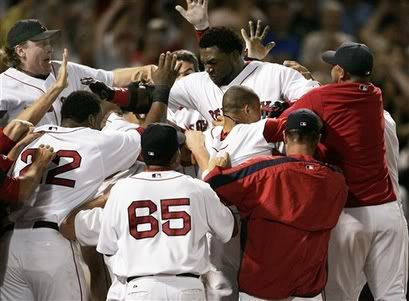Indians  Indians Archive
Indians Archive  The B-List: 7-31
The B-List: 7-31
 Indians Archive
Indians Archive  The B-List: 7-31
The B-List: 7-31
Written by
Steve Buffum
 If the 17 highlights of it on Sportscenter wasn't enough for you, Buff is here with more analysis of Fausto's second straight meltdown, and Big Papi's majestic walk off to dead center in the bottom of the ninth. In today's B-List, Buff also hits on Paul Byrd, Andy Marte's slow start, and more of his unique analysis of last nights loss to the Chowds.
If the 17 highlights of it on Sportscenter wasn't enough for you, Buff is here with more analysis of Fausto's second straight meltdown, and Big Papi's majestic walk off to dead center in the bottom of the ninth. In today's B-List, Buff also hits on Paul Byrd, Andy Marte's slow start, and more of his unique analysis of last nights loss to the Chowds.


I hate being featured in other teams' highlights.
1) Skip, that horse looks awfully tall
After Friday's game, I lobbied for Fausto Carmona to have been
given (oy, what verb tense is that? Past plu-future imperfect
degenerate?) the opportunity to close out the game, arguing that we
needed to see if he was An Answer (there is rarely The Answer, and if
there is, you're in trouble) at Closer. My argument at the time was
that the situation was tailor-made, in that it was at home, against a
weak-hitting team, starting an inning with no one on, following a
dissimilar pitcher, but close enough to actually learn something. I
stand by this, because one of the dimensions of Decision Space is time:
evaluating a decision should be done in the context of the information
available and not with respect to what happens later.
Carmona did get into a tie game later that series, and he was
truly atrocious, but hey. It doesn't change my argument, and besides,
this is not a team for which one win is important in the standings.
Instead Fausto Carmona's first Save Opportunity comes in Boston
... following two similar pitchers ... into the teeth of one of the
best offenses in major league baseball. Kudos for setting up a
challenge, but I claim that a save Friday would have done more to
prepare Carmona; heck, even a blower would have taught us something.
Now all we've learned is that Fausto Carmona can give up a home run to
David Ortiz, making him roughly one of nine thousand pitchers to do
so. Giving up a hit to Alex Cora is bad enough, but walking Youkilis
after 1-2 is truly execrable.
Look, here's my problem with Carmona: the obvious thing that a
closer must do is get people out. However, generally speaking, this
boils down to a couple key factors: the two most valuable elements of
this are missing bats and throwing strikes. This isn't terribly
different from any other successful pitcher, but it becomes magnified
for the closer who has no time to "make up" any mistakes. Wickman
didn't strike out a lot of guys, but he normally threw a lot of
strikes. Bobby Jenks threw with the accuracy of a shuttlecock last
season, but he struck out a million guys. You have to do one or the
other, and doing both is really good.
- NBA Announces 2013-2014 Schedule
- Browns Ink Sharknado
- Sharknado A No-Show For Rookie Camp
- Trent Richardson Out Until Training Camp
- Browns Sign Brandon Jackson
- Carrasco Suspended Eight Games
- Browns Add to Wide Receiver Depth with David Nelson
- Browns Need to Learn from Past Draft Mistakes
- Browns Release Chris Gocong and Usama Young
- Browns Missing on Grimes Disappointing, But Not The End
The TCF Forums
- Official- Browns Coach Search/Rumors
Larvell Blanks (Tuesday, January 21 2014 11:53 AM) - The 2014 Offseason Thread
skatingtripods (Tuesday, January 21 2014 11:52 AM) - Chris Grant's first 3 drafts
Kingpin74 (Tuesday, January 21 2014 10:13 AM) - 2015 Recruiting
furls (Tuesday, January 21 2014 6:57 AM) - Mike Brown
YahooFanChicago (Monday, January 20 2014 11:15 PM) - Movies coming out
HoodooMan (Monday, January 20 2014 9:34 PM) - 2014 Hoops Hockey Hijinx
jpd1224 (Monday, January 20 2014 4:44 PM) - 2014 Recruiting
jclvd_23 (Monday, January 20 2014 2:26 PM) - Wish List - #4 Pick
Hikohadon (Monday, January 20 2014 1:26 PM) - #1 overall pick Anthony Bennett
TouchEmAllTime (Sunday, January 19 2014 1:28 PM)


